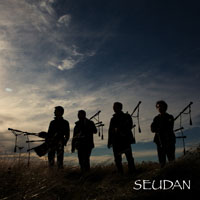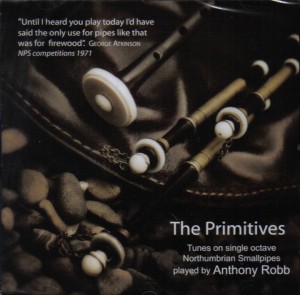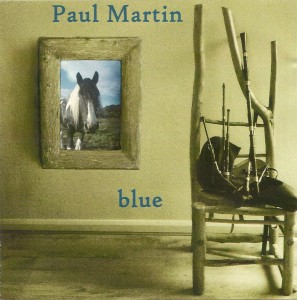Suedan, “Seudan” Greentrax CDTRAX 362 –
Anthony Robb, “The Primitives” Hooky Mat Records HMR014 –
Paul Martin, “Blue” www.piperpaulmartin.co.uk –
Here are three CDs worth owning. Each is made with the idea of doing something different. The first, “Seudan” arrives after great anticipation. The second is a beautiful example of “less is more.” And the third is an unselfconsciously genuine article. These days when so many necessities cost more and more, CDs seem more and more of a luxury. Just sitting in a comfortable chair to do nothing but listen to music can seem frivolous. These are three CDs worthy of such indulgence.
“Seudan,” Gaelic for jewel, are Angus MacKenzie, Angus Nicolson, Calum MacCrimmon, and Fin Moore. Allan MacDonald also appears on the CD. Allan’s contribution alone is worth the price of admission. Maggie MacInnes also provides a song. Canadian Mac Morin lifts up the lot with his piano. The four pipers should be well known to readers of this web site as members, respectively, of Daimh, The Angus Nicolson Trio, Braebach, and Hamish & Fin Moore Pipemakers. The album is a show piece for the Moores’ Highland pipes pitched in “A” based on the “Black Set of Kintail” in the Inverness Museum. This might be titled “The Piper and the Maker 2.0.”
 The tone of the Highland pipes in “A” is like a cool, foggy morning on the bay. Is this the long lost tonality of the Highland bagpipe as claimed in the liner notes? Research by Barnaby Brown and others indicate that the “lost” pitch is closer to Bb (“The Highland Bagpipe,” ed. Joshua Dickson, Ashgate, Burlington, 2009, p 35). Regardless, the tonality of these pipes stands on its own. And any effort to slow the remorseless rise in pitch is welcome.
The tone of the Highland pipes in “A” is like a cool, foggy morning on the bay. Is this the long lost tonality of the Highland bagpipe as claimed in the liner notes? Research by Barnaby Brown and others indicate that the “lost” pitch is closer to Bb (“The Highland Bagpipe,” ed. Joshua Dickson, Ashgate, Burlington, 2009, p 35). Regardless, the tonality of these pipes stands on its own. And any effort to slow the remorseless rise in pitch is welcome.
The repertoire is all traditional, tempos are just right and the rhythms are exciting. Pipe band enthusiasts may quibble that the sound of four very individual stylists playing in unison lacks the seamlessness of the top pipe bands. Mac Morin’s piano and step dancing, and Allan’s tromp are greatly preferred rhythmic back up to a modern pipe band drum section which all too often appears to be oblivious of the music. The little dips into harmony and other production flares make this a recording that non-pipers will enjoy too.
The liner notes make for good reading, but there are some inaccuracies. One example is the strathspey called “Alex Currie’s,” which is in fact a nameless traditional tune found on page 42 of Barry Shear’s first book “The Gathering of the Clans Collection” (Halifax, 1991). Shears informs me that the tune was never played by Currie. Even if this CD comes with a debatable and unnecessarily emphatic “Authentic” stamped on it, it promises hours of listening pleasure.
If Seudan are “the men in black” then Anthony Robb might be “the white knight.” From the beginning his contributions to Northumbrian piping, first with The Cut and Dry Dolly Band and now with Wyndy Gyle, as well as many performances in between, have made Robb much more than just an important figure. He is a productive artist, an excellent teacher, group leader and one of the most accessible of today’s Northumbrian piping luminaries.
 “The Primitives” is a collection of thirteen tracks, some with harmonies, all played by Robb on a keyless set of pipes made by Bill Hedworth. Hedworth kept Northumbrian smallpipe making alive, teaching Colin Ross and others the nearly lost art. Here simplicity is a virtue. The pipes and the music speak for themselves without need of explanation, obvious production values or engineering tweaks. It pretends to be a simple project. But it is subtle, personal and unassuming, perhaps too much so for the casual listener. Like the Northumbrian smallpipes themselves this recording does not draw attention to itself or demand to be heard. You can easily shout over it if you want. It has a meditative, almost Zen quality, initiated by the first long, pure tones of “Chevy Chase.”
“The Primitives” is a collection of thirteen tracks, some with harmonies, all played by Robb on a keyless set of pipes made by Bill Hedworth. Hedworth kept Northumbrian smallpipe making alive, teaching Colin Ross and others the nearly lost art. Here simplicity is a virtue. The pipes and the music speak for themselves without need of explanation, obvious production values or engineering tweaks. It pretends to be a simple project. But it is subtle, personal and unassuming, perhaps too much so for the casual listener. Like the Northumbrian smallpipes themselves this recording does not draw attention to itself or demand to be heard. You can easily shout over it if you want. It has a meditative, almost Zen quality, initiated by the first long, pure tones of “Chevy Chase.”
The recording rewards the ardent traditionalist with many of the classics, “The Bonny Pit Lad,” “The Keelman ower the Land,” and “I saw My Love come Passing by Me” to name three. There are a few Scottish tunes from the North Northumbrian tradition. And one or two surprises. There are tunes that call for some key work and how Robb manages them is one of the delights of the album.
We have “the men in black,” the “the white knight,” and so I will finish with “Blue.” This is a solo CD from Paul Martin, who readers may know from the Durham based group Horseplay. There are few recordings that happily demand my attention as much as this one. He has the clean dexterity of a well trained Highland piper but goes his own traditional way with embellishments, style and rhythm. The rhythmic underpinning gives every track drive. There is sharp, bold intelligence in every track.
 Most of the tunes are from the traditional Border and Northumbrian repertoire, with a few Polish and Hungarian tunes for leavening. Tune selection includes classics like “Holey Ha’penny,” “Cut and Dry Dolly New Way” from Dixon, and “Peacock Followed the Hen” among many others. Matt Seattle’s influence is evident. There are a few original tunes from Paul, one commemorating a long cross country ride on his horse.
Most of the tunes are from the traditional Border and Northumbrian repertoire, with a few Polish and Hungarian tunes for leavening. Tune selection includes classics like “Holey Ha’penny,” “Cut and Dry Dolly New Way” from Dixon, and “Peacock Followed the Hen” among many others. Matt Seattle’s influence is evident. There are a few original tunes from Paul, one commemorating a long cross country ride on his horse.
Paul plays Scottish smallpipes, Border pipes, whistle and Northumbrian smallpipes. He plays Border pipes pitched in “A” and “G.” The sound of his “G” pipes is so attractive I bought a set for myself. Ian Corrigan of Deerness Pipes is the maker. Tasteful accompaniment comes from melodeon, accordion, fiddle, and bouzouki. Paul himself provides some percussion and tromp back up. Unlike too many piping CDs the drones can be heard clearly. It is all too rare these days. This is pure, clean and unadulterated pipe music, but flashy enough to be accessible to non-pipers.
The CD is named after Paul’s horse, Blue, a sturdy Durham breed known as a Coloured Cob, a Gypsy Cob, or Vanner. This CD also has a rare and sturdy nature, and stands out from the herd, and needs to be heard by every piper interested in more than who won the medals at Oban and Inverness. Competition pipers might pick at some of his technique, but like his war horse Paul’s piping is muscular, unwavering, hints at fierceness just beneath its calm expression. Gordon Duncan was called a “National treasure,” and so he was. Paul Martin is a piping treasure of his own ilk and “Blue” is a jewel.
John Dally of Burton, Washington has been playing bagpipes since the age of 11. Equally comfortable with Highland. Lowland and Northumbrian pipes and repertoire, he is the author of “The Northwest Collection of Music for the Scottish Highland Bagpipe. A Collection of Music, Photographs and Essays.”
Just ordered a copy of The Primitives….looking forward to it!